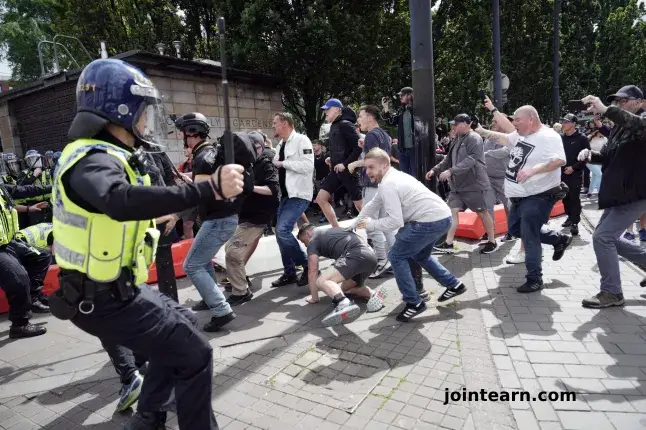May 7, 2025 — A damning new report by England’s police watchdog reveals that UK police forces were too slow to counter online misinformation, allowing false narratives to ignite the Southport riots and spread violent unrest across the country.
Sir Andy Cooke, Chief Inspector of Constabulary, concluded in the review that a delayed and ineffective response to fake news following the tragic murders of three children in Southport last July created an information vacuum quickly filled by misleading content on social media.
The victims — Bebe King (6), Elsie Dot Stancombe (7), and Alice Da Silva Aguiar (9) — were killed at a Taylor Swift-themed dance class by Axel Rudakubana, then 17. False claims rapidly circulated online suggesting he was a Muslim asylum seeker who had arrived in the UK on a small boat. In fact, Rudakubana was born in Cardiff to Christian Rwandan parents who immigrated in the 1990s.
Online Misinformation Triggered Nationwide Riots
What began as local unrest in Merseyside quickly escalated into nationwide anti-immigration protests, fueled by viral online posts. The watchdog found no evidence of premeditated or coordinated efforts by extremist groups. Instead, influencers and disaffected individuals used digital platforms to incite participation and spread unrest.
Sir Andy Cooke warned:
“They need to fill the information void that we saw throughout this disorder… because that misinformation and disinformation could go viral very, very quickly.”
Police Must Be More Proactive with Media and Online Response
The report urged law enforcement to build stronger ties with mainstream media to push out accurate information during crises and actively counter false narratives online. It emphasized the critical role of neighbourhood policing and the growing challenge of virtual communities, whose communications occur mainly through social media.
Sir Andy added:
“The emergence of virtual communities has created additional challenges and demands for policing. Forces must be able to deal with harmful information that spreads rapidly online.”
The review also called for tech companies to take quicker action in removing harmful and misleading content, while recommending updates to legislation and regulation to support law enforcement efforts in the digital information space.
Key Recommendations from the Report:
-
Police should respond faster to false narratives online during crises.
-
Forces must build better relationships with traditional media to combat misinformation.
-
Tech giants need to remove harmful content more efficiently.
-
Stronger legislation and regulation are needed to enforce action on illegal digital content.
-
Continued investment in neighbourhood policing is vital for community trust and early threat detection.
Conclusion
The Southport riots underscore the growing dangers posed by unchecked misinformation online. As digital narratives increasingly influence public sentiment and behavior, police forces must evolve their strategies and technologies to safeguard public safety in both the physical and virtual realms.






